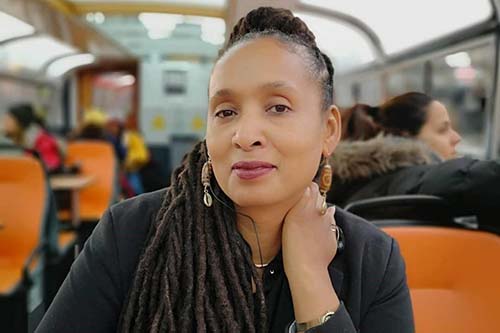
- Details
- By Rich Tupica
DETROIT — When award-winning poet, educator and author Shonda Buchanan writes about her African-American family’s American-Indian roots, she’s telling “the real story of America and its founding.”
Buchanan is an award-winning poet, educator and author of Black Indian, a 2019 memoir exploring her family’s legacy of being African-Americans with American Indian roots and the societal exclusions the combination brought.
Buchanan is headed to University of Detroit Mercy Feb. 5 at 6:45 p.m. to discuss Black Indian as part of the university's Black History Month celebrations and will speak on why she penned such a personal account of her life.
“I was inspired to write Black Indian because I wanted to tell the story of my family, and particularly the story of African American families with American Indian blood connections or oral history,” Buchanan said in a statement. “Our story is the real story of America and its founding.”
Born in Kalamazoo, Buchanan offers up historic stories, but also intimate glimpses of her family’s dynamics. According its description, Black Indian tells the story of her Michigan tribe: “A comedic yet manically depressed family of fierce women, who were everything from caretakers and cornbread makers to poets and witches, and men who were either ignored, protected, imprisoned or maimed — and how their lives collided over love, failure, fights and prayer despite a stacked deck of challenges, including addiction and abuse.”
Buchanan earned bachelor’s and master’s degrees in English from Loyola Marymount University and a Master of Fine Arts from Antioch University. She now teaches at Loyola Marymount in Los Angeles. So far, the author said she’s had a surge of positive feedback, as well as outreach from readers who’ve garnered healing from Black Indian.
“Because of the difficult yet important subject matter... I do believe my book has changed lives,” Buchanan said. “I have had several people contact me to tell me how my book helped them confront a family member about something that happened in the past. When I hear that kind of story, I think my work has been accomplished. Because the purpose of writing, the purpose of telling stories, is to help someone in some way, shape or form. I really believe that language can be a catalyst to change our lives and I write in that manner.”
The book talk will take place in the Ballroom, located on the second floor of the Student Union on Detroit Mercy’s McNichols Campus. A book signing will follow the talk. This event is sponsored by the College of Liberal Arts & Education, the African American Studies program and the Black Abolitionist Archive. To learn more about Detroit Mercy’s Black History Month celebration, visit.
More Stories Like This
Watermark Art Center to Host “Minwaajimowinan — Good Stories” ExhibitionMuseums Alaska Awards More Than $200,000 to 12 Cultural Organizations Statewide
Zuni Youth Enrichment Project Takes Top Emerging Artist Apprentices to Phoenix for Artistic Exploration and Cultural Immersion
From Dishwasher to Award-Winning Chef: Laguna Pueblo's Josh Aragon Serves Up Albuquerque's Best Green Chile Stew
Rob Reiner's Final Work as Producer Appears to Address MMIP Crisis
Help us defend tribal sovereignty.
At Native News Online, our mission is rooted in telling the stories that strengthen sovereignty and uplift Indigenous voices — not just at year’s end, but every single day.
Because of your generosity last year, we were able to keep our reporters on the ground in tribal communities, at national gatherings and in the halls of Congress — covering the issues that matter most to Indian Country: sovereignty, culture, education, health and economic opportunity.
That support sustained us through a tough year in 2025. Now, as we look to the year ahead, we need your help right now to ensure warrior journalism remains strong — reporting that defends tribal sovereignty, amplifies Native truth, and holds power accountable.
 The stakes couldn't be higher. Your support keeps Native voices heard, Native stories told and Native sovereignty defended.
The stakes couldn't be higher. Your support keeps Native voices heard, Native stories told and Native sovereignty defended.
Stand with Warrior Journalism today.
Levi Rickert (Potawatomi), Editor & Publisher
